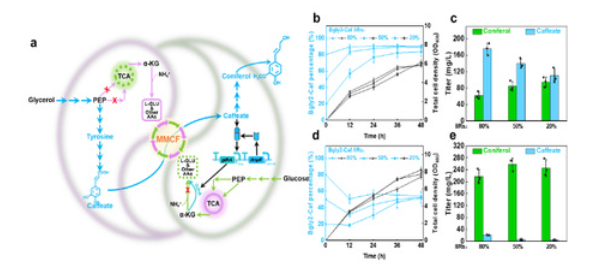In Beijing time on March 23, 2022, "Nature Communications" published online the latest research achievement titled "Design of stable and self-regulated microbial consortia for chemical synthesis" by Professor Yuan Qipeng and Professor Sun Xinxiao from our School of Life Science and Technology. The study proposes a design concept of mutualistic symbiosis combining multiple metabolites with biological sensing (static + dynamic), establishes a stable self-regulating co-cultivation system, explores the principles of substance exchange among cell communities, and provides a platform for the efficient synthesis and industrial scale-up of complex chemicals.
Microbial co-cultivation systems have advantages such as labor division to reduce workload, modular construction for ease of optimization, but currently face issues like poor system stability, lack of autonomous regulation capabilities, and challenges in industrial scale-up. To establish a stable co-cultivation system, the research presents a design concept of mutualistic symbiosis with multiple metabolites, strengthens the interdependence among microbial populations, and proposes selection criteria for relevant metabolic pathways, namely metabolite diversity, importance for growth, and membrane permeability. Based on these criteria, key cellular functions related to energy metabolism and amino acid synthesis are controlled to establish close material exchange relationships between cells. The Escherichia coli co-cultivation system constructed based on this displays excellent stability, with stable proportions of bacterial population and product yields maintained for 10 consecutive days.
In order to achieve self-regulation of microbial community proportions, this study proposes a solution for population control through the use of metabolite-responsive biosensors. The lack of biosensors with response specificity and appropriate dynamic range is a major obstacle to implementing this strategy. Therefore, a biosensor identifying and characterizing the response intermediate caffeic acid was developed, integrated into a co-culture system to achieve autonomous regulation of microbial community proportions, resulting in a 2-fold increase in the production of product taxadiene. By extending the design strategy combining static and dynamic phases to a three-strain co-culture, the biosynthesis of silybinin was achieved. This study not only provides a technical platform for the efficient synthesis of complex chemicals but also offers an artificial model for studying the complex material and information exchange in natural microbial communities.

Figure 1. Design and application of a stable self-regulating co-culture system.
Yuan Qipeng and Sun Xinxiao, professors at the School of Life Science and Technology, Beijing University of Chemical Technology, are the corresponding authors of this article. PhD student Li Xianglai is the first author of this article, and Beijing University of Chemical Technology is the first completion unit of the paper. This research work is supported by the Key R&D Program of the Ministry of Science and Technology and the National Natural Science Foundation of China.
Original link: https://www.nature.com/articles/s41467-022-29215-6


